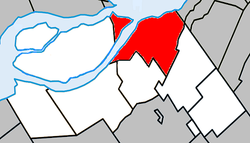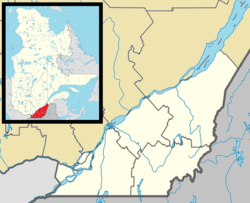City in Quebec, Canada
| Beauharnois | |
|---|---|
| City | |
 | |
 Location within Beauharnois-Salaberry RCM Location within Beauharnois-Salaberry RCM | |
 | |
| Coordinates: 45°19′N 73°52′W / 45.32°N 73.87°W / 45.32; -73.87 | |
| Country | Canada |
| Province | Quebec |
| Region | Montérégie |
| RCM | Beauharnois-Salaberry |
| Constituted | January 1, 2002 |
| Government | |
| • Mayor | Alain Dubuc |
| • Federal riding | Salaberry—Suroît |
| • Prov. riding | Beauharnois |
| Area | |
| • Total | 83.40 km (32.20 sq mi) |
| • Land | 68.22 km (26.34 sq mi) |
| Population | |
| • Total | 13,638 |
| • Density | 199.9/km (518/sq mi) |
| • Pop (2016-21) | |
| • Dwellings | 6,451 |
| Time zone | UTC−5 (EST) |
| • Summer (DST) | UTC−4 (EDT) |
| Postal code(s) | J6N |
| Area codes | 450 and 579 |
| Highways | |
| Website | ville |
Beauharnois (/boʊˈhɑːrnwɑː/; French pronunciation: [boaʁnwa]) is a city located in the Beauharnois-Salaberry Regional County Municipality of southwestern Quebec, Canada, and is part of the Greater Montreal Area. The city's population as of the Canada 2021 Census was 13,638. It is home to the Beauharnois Hydroelectric Power Station, as well as the Beauharnois Lock of the Saint Lawrence Seaway.
History

During the Lower Canada Rebellion, the Battle of Beauharnois was fought in 1838, between Lower Canada loyalists and Patriote rebels. After Edward Ellice and his family were taken prisoner by rebels, the townspeople rebelled. The British were able to quash the rebellion and captured over a hundred Patriote rebels.
The Beauharnois Canal was dug between 1842 and 1845 to connect the lakes Saint-Louis and Saint-Francois as part of a larger project that included the expansion of the Lachine canal. During these years, however, a series of labor conflicts emerged during the canal's construction. On June 3, 1843, a strike began at the canal's construction site. A battle ensued between the striking workers and employers, resulting in the death of five workers and 50 additional injured. The violence unleashed during the strike represented the bloodiest repression against workers in Canadian history.
As part of the 2000–2006 municipal reorganization in Quebec, the neighbouring towns of Maple Grove and Melocheville were amalgamated into Beauharnois on January 1, 2002.
Geography
Communities
In addition to the main population centre of Beauharnois, the following locations are within the municipality's boundaries:
- Domaine-de-la-Pointe-des-Érables (45°19′29″N 73°51′11″W / 45.32472°N 73.85306°W / 45.32472; -73.85306 (Domaine-de-la-Pointe-des-Érables, Beauharnois, QC)) – a residential area north of Maple Grove
- Maple Grove (45°19′15″N 73°50′20″W / 45.32083°N 73.83889°W / 45.32083; -73.83889 (Maple Grove, Beauharnois, QC)) – a former municipality that makes up the northeast boundary of Beauharnois
- Melocheville (45°19′02″N 73°56′15″W / 45.31722°N 73.93750°W / 45.31722; -73.93750 (Melocheville, Beauharnois, QC)) – a former municipality that makes up the western boundary of Beauharnois, located on the west shore of the Beauharnois Canal
- Parc-Tisseur (45°17′42″N 73°53′02″W / 45.29500°N 73.88389°W / 45.29500; -73.88389 (Parc-Tisseur, Beauharnois, QC)) – a residential area in southern Beauharnois
- Rivière-Nord (45°00′34″N 74°24′04″W / 45.00944°N 74.40111°W / 45.00944; -74.40111 (Rivière-Nord, Beauharnois, QC)) – a hamlet in southern Beauharnois
- Saint-Paul (45°18′33″N 73°53′51″W / 45.30917°N 73.89750°W / 45.30917; -73.89750 (Saint-Paul, Beauharnois, QC)) – a residential area located on Route 205
Lakes & rivers
The following waterways pass through or are situated within the municipality's boundaries:
- Rivière Saint-Louis (45°18′55″N 73°52′49″W / 45.31528°N 73.88028°W / 45.31528; -73.88028 (Rivière Saint-Louis, Beauharnois, QC)) – runs south to north through the city centre, down Chute de la Rivière Saint Louis, emptying into the Saint Lawrence River.
Demographics
|
|
| ||||||||||||||||||||||||||||||||||||||||||||||||||||||||||||||||||
| Amalgamated with Maple Grove and Melocheville on January 1, 2002. Source: Statistics Canada | ||||||||||||||||||||||||||||||||||||||||||||||||||||||||||||||||||||
In the 2021 Census of Population conducted by Statistics Canada, Beauharnois had a population of 13,638 living in 6,293 of its 6,451 total private dwellings, a change of 5.9% from its 2016 population of 12,884. With a land area of 68.22 km (26.34 sq mi), it had a population density of 199.9/km (517.8/sq mi) in 2021.
Canada census – Beauharnois community profile| 2021 | 2016 | 2011 | |
|---|---|---|---|
| Population | 13,638 (+5.9% from 2016) | 12,884 (+7.3% from 2011) | 12,011 (+0.8% from 2006) |
| Land area | 68.22 km (26.34 sq mi) | 69.31 km (26.76 sq mi) | 69.09 km (26.68 sq mi) |
| Population density | 199.9/km (518/sq mi) | 185.9/km (481/sq mi) | 173.9/km (450/sq mi) |
| Median age | 43.2 (M: 42.0, F: 44.4) | 46.1 (M: 45.2, F: 46.9) | 46.5 (M: 45.8, F: 47.2) |
| Private dwellings | 6,451 (total) 6,293 (occupied) | 6,072 (total) | 5,585 (total) |
| Median household income | $69,500 | $55,706 | $51,185 |
References: 2021 2016 2011 earlier
| Canada Census mother tongue - Beauharnois, Quebec | ||||||||||||||||||
|---|---|---|---|---|---|---|---|---|---|---|---|---|---|---|---|---|---|---|
| Census | Total | French | English | French & English | Other | |||||||||||||
| Year | Responses | Count | Trend | Pop % | Count | Trend | Pop % | Count | Trend | Pop % | Count | Trend | Pop % | |||||
| 2016 | 12,670 | 11,865 | 93.65% | 505 | 3.98% | 115 | 0.91% | 185 | 1.46% | |||||||||
| 2011 | 11,935 | 11,245 | 94.22% | 460 | 3.85% | 105 | 0.88% | 125 | 1.05% | |||||||||
| 2006 | 11,695 | 11,055 | 94.53% | 395 | 3.38% | 45 | 0.38% | 200 | 1.71% | |||||||||
| 2001 | 6,240 | 5,990 | 95.99% | 150 | 2.40% | 65 | 1.04% | 35 | 0.56% | |||||||||
| 1996 | 6,265 | 6,055 | n/a | 98.75% | 130 | n/a | 0.69% | 40 | n/a | 0.33% | 40 | n/a | 0.23% | |||||
| Amalgamated with Maple Grove and Melocheville on January 1, 2002 | ||||||||||||||||||
Economy
In 2012, OVH started construction of its first Canadian data centre in Beauharnois, one of the largest in the world.
See also
References
- ^ "Banque de noms de lieux du Québec: Reference number 133648". toponymie.gouv.qc.ca (in French). Commission de toponymie du Québec.
- ^ "Répertoire des municipalités: Beauharnois". www.mamh.gouv.qc.ca (in French). Ministère des Affaires municipales et de l'Habitation. Retrieved 27 September 2023.
- Riding history for Beauharnois—Salaberry, Quebec from the Library of Parliament
- ^ "Beauharnois, Ville (V) Census Profile, 2021 Census of Population". www12.statcan.gc.ca. Government of Canada - Statistics Canada. Retrieved 27 September 2023.
- The Canadian Press Stylebook (18th ed.), Toronto: The Canadian Press, 2017
- "Insurrection des patriotes à Beauharnois en 1838 (L') de Marcel Labelle". Septentrion. Retrieved 2023-09-08.
- "Robert Nelson: 2. Leads Patriotes to Defeat". www.raidersandrebels.com. Retrieved 2023-09-08.
- "Site patrimonial de l'Entrée-Inférieure-de-l'Ancien-Canal-de-Beauharnois - Beauharnois (Ville)". toponymie.gouv.qc.ca. Retrieved 2023-09-08.
- "Fiche descriptive". archive.wikiwix.com. Retrieved 2023-09-08.
- ^ Statistics Canada: 1996, 2001, 2006, 2011 census
- "2021 Community Profiles". 2021 Canadian census. Statistics Canada. February 4, 2022. Retrieved 2023-10-19.
- "2016 Community Profiles". 2016 Canadian census. Statistics Canada. August 12, 2021. Retrieved 2023-09-27.
- "2011 Community Profiles". 2011 Canadian census. Statistics Canada. March 21, 2019. Retrieved 2014-01-29.
- "2006 Community Profiles". 2006 Canadian census. Statistics Canada. August 20, 2019.
- "2001 Community Profiles". 2001 Canadian census. Statistics Canada. July 18, 2021.
External links
| Adjacent Municipal Subdivisions | ||||||||||||||||
|---|---|---|---|---|---|---|---|---|---|---|---|---|---|---|---|---|
| ||||||||||||||||
| Cities | |
|---|---|
| Municipalities | |
| Parish municipalities | |
| |